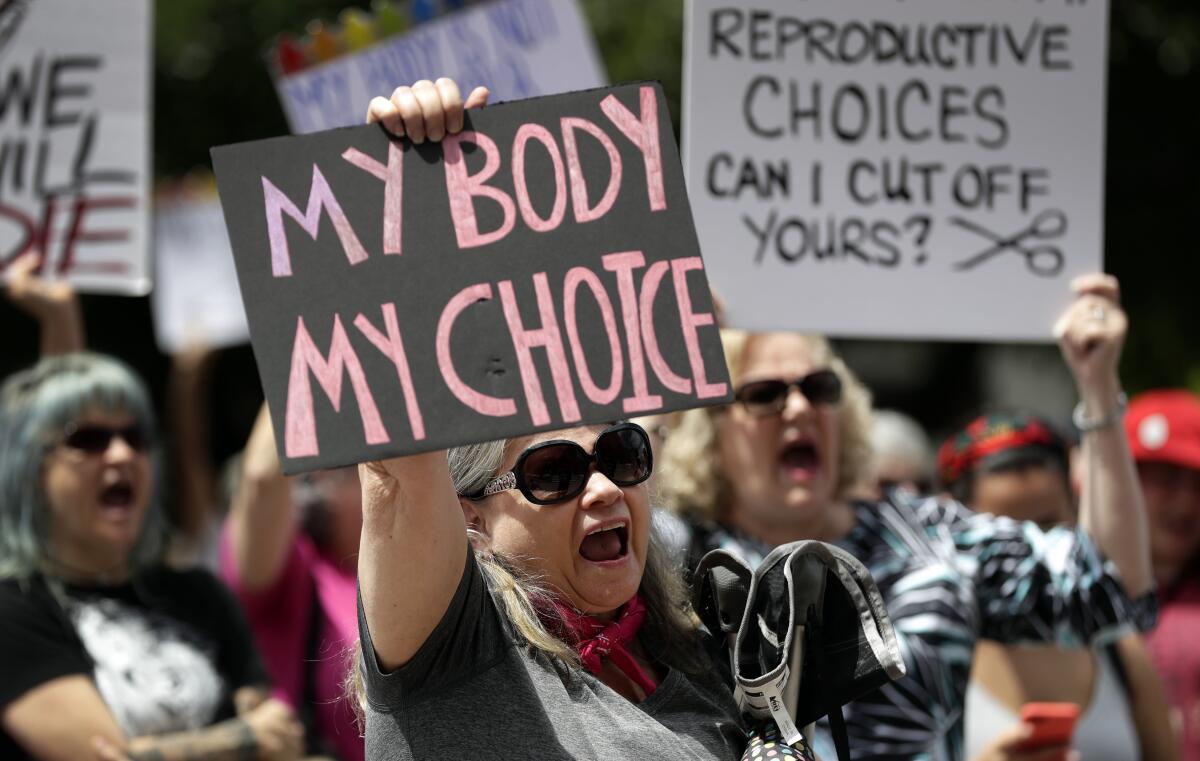Editorial: Texas is about to turn private citizens into anti-abortion vigilantes

A horrendous new Texas law scheduled to go into effect Wednesday would ban abortion when a fetal heartbeat is detected —typically around six weeks of gestation — and turn individuals into antiabortion vigilantes by empowering them to file civil suits against anyone who provided an abortion or helped procure one.
Lawyers for a group of abortion clinics, doctors and advocates asked the U.S. Supreme Court on Monday to block the law, at least temporarily, pending a legal challenge. The high court should do so.
The law, adopted in May, is a breathtaking subversion of the constitutional right to a safe and legal abortion. It’s not surprising that it was concocted by a state legislature notorious for its efforts to hinder women from accessing abortion.
This time, the state lawmakers have outdone themselves. The law would narrow the window during which a person could terminate a pregnancy. At six weeks, most people don’t even know they are pregnant. And it would so scare doctors and clinics — with the threat of citizen-led lawsuits — that they simply stop providing abortions. And that is one goal of the law — to intimidate women’s health clinics, which also provide contraception and OB-GYN services, into discontinuing abortion services.
Nowhere in the U.S. is abortion banned as early as six weeks. Abortion is legal up to the point of viability outside the body — roughly 24 weeks into a pregnancy. That line has been established by landmark Supreme Court cases, including Roe vs. Wade (1973). There have been other state laws that ban abortions at six or eight weeks — or some other early point in the pregnancy — but they have been struck down by federal courts.
But with Texas Senate Bill 8, lawmakers have tried to get around federal precedent by creating a law that can be enforced only by private individuals going into state courts to sue abortion clinics and others. Texas state and local government agencies would have no part in enforcing this law.
Instead, it’s up to individuals to enforce the law — and if they win in the courts, they would be awarded at least $10,000. They would be allowed to sue anyone even remotely connected to getting someone an abortion — a clinic, a doctor who performed an abortion, a nurse who helped, even the driver who took the pregnant person to the clinic. The pregnant person could not be sued. That exemption sounds sympathetic to the mother-to-be, doesn’t it? But consider this: The law says that the defendants who get sued are not allowed to argue that they were only helping the pregnant person exercise her constitutional rights.
So the one individual — the pregnant person — who would stand the best chance of prevailing in this court of the absurd would not even be allowed to be sued.
In Texas, about 85 to 90% of abortions are performed at or beyond six weeks. If this law goes through, it’s likely that most of those who want to end a pregnancy in Texas won’t realize they are pregnant in time to get a legal abortion.
Some clinics — there are currently 21 in Texas — will simply stop offering abortions altogether. Amy Hagstrom Miller, the chief executive of Whole Woman’s Health, which runs four clinics in Texas, says her clinics will comply with the law, if it stands, by offering abortions only up to six weeks.
“Our staff are terrified of being sued,” she said, noting that even if doctors ultimately prevailed, they would have to first defend themselves in costly civil proceedings.
Miller says abortion opponents routinely stand outside the clinics, watching who comes and goes and videotaping staff and patients. “These people on the sidewalks already know the names of our nurses and doctors and staff,” making note of staff name tags and vehicle license plates, she said. “This is not some abstract legal theory to our staff.”
Abortion clinics and advocates have challenged the law by suing Texas court clerks and state judges who would be involved in these civil proceedings. “Our point is that individuals can’t enforce those laws by themselves,” says Marc Hearron, senior counsel for the Center for Reproductive Rights. Court clerks and judges are involved in bringing the cases into court.
The Supreme Court has agreed to hear a case from Mississippi that would ban abortions at 15 weeks onward. The nation is already on tenterhooks, waiting to see whether Roe will be left standing. While that larger battle proceeds, the federal courts need to stop this crazy Texas law. before it wreaks havoc on women’s lives.
More to Read
A cure for the common opinion
Get thought-provoking perspectives with our weekly newsletter.
You may occasionally receive promotional content from the Los Angeles Times.










